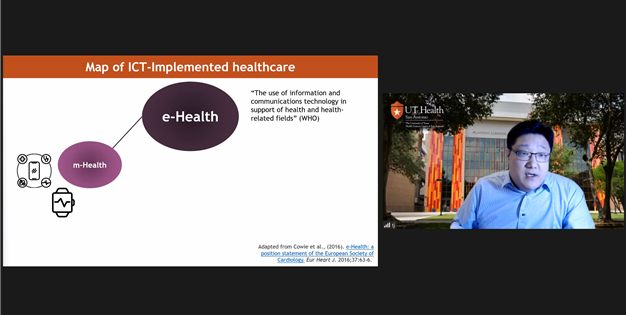
일시: 3/15 (화) 오후 12시 30분 – 2시
발표자: Tae Joon Moon (University of Texas at San Antonio)
Tae Joon Moon is an assistant professor in the Department of Psychiatry and Behavioral Sciences at the University of Texas Health Science Center at San Antonio (UTHSCSA). He earned his doctoral degree in communication from the University of Wisconsin-Madison (UW-Madison) focusing on health communication and information technologies. During his graduate studies, he participated in multiple research projects that investigated the effectiveness of technology-implemented health support systems at the Center for Health Enhancement Systems Studies (CHESS) housed in the Department of Industrial Engineering, one of the five NCI-granted Centers of Excellence in Cancer Communication Research (CECCR) II nationwide. He also completed postdoctoral research training in behavioral psychopharmacology as a NIDA T32 trainee at the Addiction Research, Treatment & Training Center of Excellence at UTHSCSA, where he specialized in cognitive-behavioral treatment using remote sensors such as remote alcohol monitors and carbon monoxide breathalyzers.
The overarching theme of his research is to enhance health communication and improve clinical outcomes using cutting-edge technologies. Specifically, the topics of his research include the development of online/mobile health support systems, the role of social support groups in psychosocial adjustment among people with cancer or substance use disorder, and the effectiveness of remote interventions using wearable devices/biosensors. His current study examines the efficacy of remotely-administered cognitive-behavioral interventions using remote transdermal alcohol monitors to reduce excessive alcohol use among non-treatment-seeking heavy drinkers. Methodologically, he applies computational linguistic analysis to identify the types of communication that can contribute to better psychosocial adjustment (e.g., self-esteem, quality of life, positive coping), which can be used for developing automated personalized feedback/responses systems in mHealth/eHealth interventions.
제목: Leveraging Emerging Technologies to Improve the Quality of Alcohol Treatment
초록:
Alcohol misuse is the third leading preventable cause of death in the US with an estimated annual cost of ~$249B. While 14.1 million adults in the US have alcohol use disorder, more than 90% of them did not receive any treatment or help due to barriers such as social stigma, logistic challenges, financial concerns, and misperception of treatment. Even among those who were treated, 1-year relapse rates after treatment are up to 75%, suggesting the need for ongoing recovery support.
Recent advances in mobile health technologies (e.g., remote biosensors, smartphone applications) offer the promise of lowering the treatment barriers and improving the effectiveness of care for alcohol use disorder. Telehealth technologies (e.g., teleconferencing, remote treatment) can reduce physical and psychological barriers and maintain the continuity of care during and after treatment. Online and mobile treatment platforms can provide brief motivational interventions to increase awareness of the drinking problems and enhance motivation to change. Wearable devices and biosensors enable the continuous assessment and timely feedback. There is an unparalleled opportunity to leverage emerging technologies to create more advanced care for people with alcohol use disorder.
In this talk, I will present two translational research projects using emerging technologies to reduce excessive alcohol use. Using computational linguistic analysis, the first study identifies the nature of supportive communication in a virtual support group and examines how communication in a virtual support group helps heavy drinkers reduce alcohol use. The second study investigates the efficacy of a contingency management procedure informed by remote transdermal alcohol monitoring in reducing excessive alcohol use among driving-while-intoxicated arrestees. Current and future research projects extending these studies will be introduced as well.

